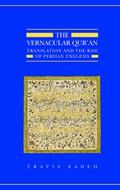
This book examines how early juridical and theological debates on the translatability of the Qur’an informed the development of Persian translations and commentaries of the Qur’an. While it is generally believed that Muslims in the eighth to twelfth centuries were disdainful of translating the Qur’an, the historical record proves to be much more nuanced.
Although the philosophy of some schools of law was that the divine nature of the Qur’an could not be conveyed in a language other than Arabic, the reality was that Persian exegetical translations were considered acceptable for use by new converts to Islam. These translations preserved the Arabic text of the Qur’an and, interlinearly, wove Persian commentaries between its lines and verses, thereby preserving the sacred script while expanding on and making the text available to a wider audience. The author gives a thorough overview of the development of Persian exegetical writing, from rhyming translations to major commentaries, starting with the emergence of New Persian literature in the tenth century and continuing on until the institutionalisation of Persian as a language that rivalled Arabic in courts and educational institutions.
Through a series of detailed case studies, this book offers new insight into the development of Qur’anic hermeneutics and its relationship to vernacular cultures, religious elites, institutions of education, and dynastic authority. Presented for the first time to an English readership is a broad array of archival material, spanning five centuries and drawn from across the Middle East, Central Asia and South Asia.
